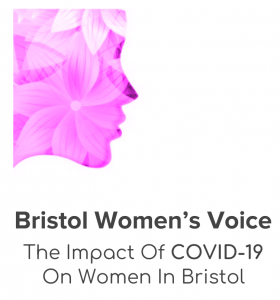 We are in extraordinary times and the impact on everything we have taken for granted is something we are all struggling with. There are many decisions that the government has taken that affect women, and some decisions that may affect us adversely.
We are in extraordinary times and the impact on everything we have taken for granted is something we are all struggling with. There are many decisions that the government has taken that affect women, and some decisions that may affect us adversely.
Throughout the first lockdown period, we asked women in Bristol to tell us about your personal experience so we were able to collect real-time voices. We felt this was important because women have been a glaring omission in decision making. As the Fawcett Society say in its statement signed by many women’s organisations, “Women and girls in the UK have been largely invisible from the debate and excluded from decision making.” This is in contrast to the impact that the virus itself and the measures to combat it will have on women.
Between June and August of 2020, we surveyed 177 respondents in total and held six online focus groups to find out what impact Covid-19 and the resulting restrictions are having on women’s lives. We will be using these findings, and those of the City Listening Project, to hold strategic influencers and local government representatives accountable for inclusive, Covid-related decision making across the city.
Key findings
- Women’s mental health has been deteriorating throughout lockdown, particularly
because they are faced with the societal expectation of working and looking after a
family, causing significant anxiety amongst the women we spoke to. - BAME women have experienced significantly more loss and bereavement and their
mental health has been impacted. Furthermore, they spoke of how the unequal impacts of
the virus and of systemic racism as a whole feeling too much to cope with. - The lack of childcare and the lack of information about when and how childcare will
resume has been one of the major concerns from the women we have spoken to. Both
their employment and their mental health has been affected as a result of this. - Access to green spaces was crucial for women, particularly for those without gardens, for
mental and physical health. However many women, particularly those shielding, felt
unsafe in public parks and as if they were less visible. - The government responses to the pandemic, both national and to a lesser extent local,
were seen as a source of anxiety for women. They felt the lack of clarity in government
messages was a source of stress, and the lack of information left them feeling unable to
judge how to respond. - Disabled women felt under-represented in government and found that government
responses and language were out of touch with their lived experiences. - While some women were glad for the opportunity to work from home, either because of
the lack of commute or the extra time at home, the majority found working from home
challenging particularly if they had caring responsibilities. - Younger women and students were by far the most concerned about their employment
prospects. - Prosocial behaviour was identified by the majority of women as a positive part of
lockdown, either in the form of an increased sense of community or by participating in
voluntary work. Community organisations in Bristol were seen as having a crucial role
throughout lockdown because of this.

